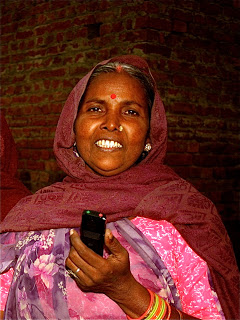Stories of Hope I: Women Changemakers in the Field

Ram Ratti, Master Trainer with the
Gorakhpur Environmental Action Group (GEAG) Photo Credit: Arshinder Kaur
This inspiring story of an Indian woman farmer is a testament to the change women bring to their families and communities when given access to training and resources. This interview was taken by Arshinder Kaur, WEA’s India Coordinator, during her visit to Gorakhpur Environmental Action Group (GEAG) in Uttar Pradesh.
Ram Ratti is a knowledgeable woman farmer, a landowner and a powerful leader who has challenged social norms in her community. She has practiced sustainable farming methods in her farm for the past 10 years thanks to the training she received from GEAG.
Drawing upon her GEAG training in sustainable agriculture, Ram Ratti generated enough savings from the sale of her produce to purchase one acre of fertile land in her community. Now a proud land owner, she uses inter-cropping and crop rotation practices learned from GEAG to increase the productivity of her farm naturally and improve soil fertility. She grows bananas , shatalu vines, kidney beans, rice, peas and radishes. She works hard to maximize her agricultural output during dry season harvests, cultivating over 32 crop varieties each season. Monsoons are often devastating in Ram Ratti’s village, halting farming for two months and flooding her land with over two feet of water. To mitigate the devastating effect of monsoon floods, Ram Ratti cultivates flood resistant shatalu vines—a technique learned from GEAG—to provide food during the monsoon months.
As a result of her GEAG training, Ram Ratti has taught 200 women in her village sustainable agriculture practices; ninety of these women are now smallholder organic farmers with a diverse group of crops cultivated from local seed varieties. Ram Ratti is also challenging stigmas surrounding female attendance at GEAG extension services in her village. Prior to Ram Ratti’s farming success, many women in Ram Ratti’s village would not attend these trainings because of the stigmas attached to a woman attending trainings alone. As a result, others often mocked her because she continued to attend GEAG’s trainings. The social ridicule she faced, however, dissipated when Ram Ratti saved enough to buy her own piece of land. Inspired by her example, women in her village began attending evening extension classes and developed a voice in farm management practices. Recently, Ram Ratti bought a bore well for her village to reduce everyday burden of women to fetch water. This has improved the productivity of women in her village. As a result of the GEAG training, Ram Ratti is creating adaptive solutions to climate change in her community, and is empowering other women in her community to become environmental stewards and self-sufficient organic farmers.
